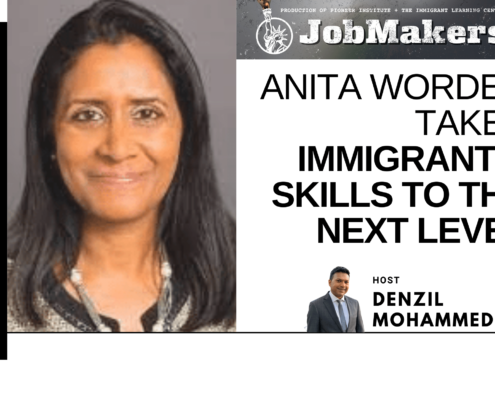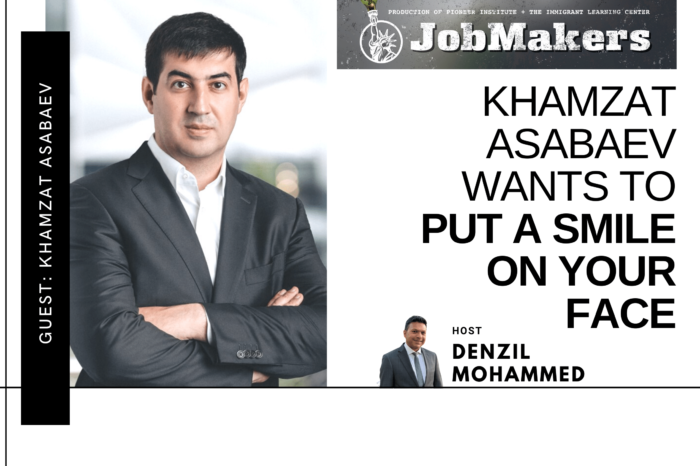Khamzat Asabaev Wants to Put a Smile on Your Face
/in Economic Opportunity, Featured, JobMakers /by Editorial StaffThis week on JobMakers, host Denzil Mohammed talks with Khamzat Asabaev, refugee from Chechnya and cofounder of SoftSmile, a software tool that helps dentists provide affordable, quality orthodontic treatment. Khamzat pursued entrepreneurship to make services accessible to all, after experiencing a lack of access to basic care as a refugee and a minority. Refugees like Khamzat face terrible circumstances, but through resilience and fortitude, often make significant contributions to their adopted homeland, with higher rates of employment and entrepreneurship. That means they give back far more than we gave them, as you’ll discover in this week’s JobMakers.
Guest:
 Khamzat Asabaev is cofounder and CEO of SoftSmile, which provides doctors with proprietary treatment planning tools that make high-quality orthodontic care affordable and accessible to patients everywhere. Khamzat graduated from Columbia Law School with a master’s in law before continuing his career at Linklaters, the leading global firm, working between London, Moscow, New York and the Middle East. At the same time, he founded and co-founded several startups, including a braces producer in Switzerland (3D Med) and a car-sharing company in Dubai (Motor).
Khamzat Asabaev is cofounder and CEO of SoftSmile, which provides doctors with proprietary treatment planning tools that make high-quality orthodontic care affordable and accessible to patients everywhere. Khamzat graduated from Columbia Law School with a master’s in law before continuing his career at Linklaters, the leading global firm, working between London, Moscow, New York and the Middle East. At the same time, he founded and co-founded several startups, including a braces producer in Switzerland (3D Med) and a car-sharing company in Dubai (Motor).
Get new episodes of JobMakers in your inbox!
Read a Transcript of This Episode
Please excuse typos.
Denzil Mohammed:
I’m Denzil Mohammed. Welcome to Jobmakers.
Denzil Mohammed:
Imagine celebrating the holiday season with family and friends, and then your country gets invaded scary. But as we see on the news, it’s real. No one wants to be a refugee, but the resilience and fortitude of refugees to withstand catastrophic displacement like that and come out on the other side is something remarkable. Something worthy our respect and something that ultimately benefits the country is their resettled in for Khamzat Asabeav, refugee from Chechnya and co-founder of SoftSmile, which produces pioneering software for dentists to make advanced treatment plan for patients without relying on third parties, not only was he displaced, but he had to grow up in the country that invaded his – Russia. His experiences shaped his life in profound ways. In response to the lawlessness of the invasion, Khamzat first pursued law, becoming a top mergers and acquisitions attorney in the UK and the middle east. Lack of access to basic care as a refugee and a minority prompted him to pursue entrepreneurship, to make basic services accessible to all. Khamzat’s story is not unique, but it’s rarely told. Refugees go through terrible things, but ultimately make significant contributions to their adopted homeland, having higher rates of employment and entrepreneurship.
Denzil Mohammed:
What does that mean? They give back far more than we give them, as you’ll discover in this week’s Jobmakers. Khamzat Asabeav, founder & CEO of SoftSmile and immigrant from Chechnya, welcome to the Jobmakers podcast. How are you?
Khamzat Asabaev:
Thank you. Doing fine and really honored to be a guest here.
Denzil Mohammed:
So tell us a little bit about your business and what makes it special.
Khamzat Asabaev:
Sure. Soft smile is a software company and I’ll give you an example. Imagine you are visiting a doctor and orthodontist and you want to make your smile perfect. So that doctor will take some measurements, will scan your teeth and and she will upload that information into a certain portal. So usually she, a doctor has to wait for weeks until someone somewhere usually oversees, prepare a treatment plan and sends back this information for coordination again, with the doctor, then there will be manufacturing. So it usually takes 4, 5, 6 weeks to have a digital treatment plan ready. Butbefore that, upfront, you paid a few thousand dollars and it’s very lengthy, costly process. What we are doing with our software, a doctor will do everything in house and can deliver to you as a patient, a treatment plan just in one day. And we believe this will lead to making orthodontics affordable and accessible. That’s basically what we’re doing.
Denzil Mohammed:
Incredible. And this entrepreneurial journey began a very long time ago when you, your family was forced to move. And so not just the idea of entrepreneurship, but the thing that you’re doing, which is making healthcare more accessible comes from that experience of being forced to move and, and hoping for better on the other side. So I know you were born in Chechnya, but you ended up having to grow up in Moscow. Tell me about that experience.
Khamzat Asabaev:
Sure. I was born in Chechnya and in 1994, actually Christmas nightNew Year’s Eve actually when Russia invaded Chechnya with full force. And we, my parents took me and their daughter and we moved to Moscowbecause we had some relatives there. That’s where I grew up. AndI saw some discrimination and some, let’s say bad things being a Chechen kid in Moscow, in Russia. Andthere was a lot of injustice back there. So thiseven when I was a child, got me thinking that maybe something more fair would be possible with even my efforts and regarding healthcare. There were cases when Chechens were rejected from getting simple healthcare in Moscow, in Russia. And when you see that you just get this idea, how’s it possible? And that’s instills your notion that actually healthcare is a absolutely fundamental, right, andit shall be provided to everyone regardless of their skin color or ethnicity or face. So it just should, must be fundamental. And when you see some injustice, especially biased injustice, let’s sayyou are trying, growing up, you are trying to fix it. And maybe that’s led to a situation when I saw an opportunity to change healthcare a little bit, I really grasped it.
Denzil Mohammed:
And that experience also influenced your first choice in a career because you, you first ended into law, you were a lawyer. Just like your father and your grandfather.
Khamzat Asabaev:
Yeah, I was actually I still consider myself, myself a lawyer because once a lawyer, always a lawyer and my counterparts in my business, they don’t understand it <laugh> but yes. Yeah, absolutely. Right. Becauselaw of people is the only alternative to the law of jungle. And I saw law of jungle being a kid where some powerful and mighty country can completely destroy lives. And again, law is the only alternative.
Denzil Mohammed:
And how did this, how did the dental care, how did that happen? Was it was just serendipitous. Was it just your friend happened to be working on this?
Khamzat Asabaev:
There are, as always are like various events converging in some particular point first again, maybe from my childhood experience, I knew that dental care orthodontics are extremely expensive and not everyone can afford it. Second. My friend who is also from Chechnya, but who didn’t leave Chechnya through the war, actually, his story absolutely impressive. He inspired me to start SoftSmile because he was an orthodontist who after graduating, after getting his dental education, he got back to Chechnya and started helping people who would never be able to afford some famous brands like in design or some of <inaudible>, something like that. So he started making those aligners and braces, inhouse, and I followed his career. I knew that he’s doing great. And at some point seeing how great he’s doing we just decided to join forces and maybe do something together. And I being a lawyer in a very famous international firm, I was able to attract investors and that’s how we started. So,
Denzil Mohammed:
So therefore your pivot into entrepreneurship was not a difficult one.
Denzil Mohammed:
Or was it?
Denzil Mohammed:
You know, I know, I know you had a bad experience starting a business in Switzerland, right?
Khamzat Asabaev:
Yes, yes. You actually, you are right. I wanted to say that there is no particular set skill for entrepreneurship and anyone can do that, butactually you’re absolutely right. My first experience demonstrates that there are always some mistakes and if you don’t have some safety net, some ability to continue, even though you made some strategic mistakes, it can be really devastating for the entire businesses. That’s what happened with our small manufacturing lab in Switzerland, just, we made some strategic mistakes and it failed which actually was good because SoftSmile now is way bigger, way more successful. We learned from our mistakes, we doing things carefully. Now we’re trying to close our weak spots. So it was, it was a good experience. Anyway, even though it failed, still we learned
Denzil Mohammed:
Failure is almost like a prerequisite, right?
Khamzat Asabaev:
Sometimes, yes, we were lucky to have those fail as as a lesson. But unfortunately, sometimes people bet everything and lose it. And this also happens. And that’s why I think everyone shall be careful measuring how much they’re investing of their efforts of their resources and where, and because failure can always happen. It just doesn’t matter how hard you are working. It, it will happen if something changes you. We just so went through COVID we just, in the middle recession, we see that there are a lot of bad things happening without our involvement, just not depending on us. And you should be ready mentally. And let’s say financially, if something happens, it’s not your fault. Just try again. And this phrase, let’s try again, is what my friend told me when we, after the company was called 3d demand. So when it failed just in few months, I already left Linklater, so I didn’t have any job. And my friend told me, let’s try again. Andwe founded SoftSmile.
Denzil Mohammed:
So how is SoftSmile doing today and how do you see its growth?
Khamzat Asabaev:
Softsmile is doing pretty well. We are a product-led company. We are very proud of our product. It’s just amazing software with dozens of intricate algorithms, which make the job, which would take hours being done in just in few minutes. So it’s 30, 35 times faster, more efficient than any alternatives on the market. And you can imagine it just transforms the entire practice of digital orthodontics. Andmost importantly people out there know it. So we are getting requests for them or for contracts. Unfortunately, I cannot due to contractual restrictions disclose names of our clients, but what I can say about 2000 patients every day are being treated with our software. So I know the theme of this podcastcreating jobs. So we are creating jobs globally, not only through SoftSmile, but also helping our clients to change their practice and attract more people and work with more doctors. That’s, that’s what we’re doing. And regarding the growth right now, we’re focused on the software, but the next step will be working directly with doctors and probably patients so that we will manufacture and design and we will go directly to consumers. So we, I have good confidence in the growth of the business
Denzil Mohammed:
As a business leader. You’ve developed some start-ups over the years, and this is something I’ve heard from other entrepreneurs, but you, you once said only after getting the product on the market, as you really see who your client base is and what level of demand looks like. I’ve heard this from many different entrepreneurs. Can you describe this a little bit more on how it might work with different kinds of companies versus like a software company?
Khamzat Asabaev:
Sure. So you, as an entrepreneur, you have this choice kind of balance, and one thing you wanna make everything perfect or as close to the perfection as possible before you show it to even your friends. And on the other hand, you want real feedback. You want to understand whether what you’re building is worth and here, where the problem happens. So if you are insecure, if you let’s say scared of showing your product to the market, you will find any opportunity to delay the launch and try to make it as great as possible. But the problem which usually happens that the market evolves and your clients needs evolve and your competitors, they are not sleeping. So they’re also doing something. That’s why I believe, although it’s bit scary, but you shall try to give you product to as many people as possible.
Khamzat Asabaev:
Provided always you protected from IP perspective, from tech perspective, because there are various strange stories where technology from a young startup is stolen by someone. So you should always think about it, but without real feedback from your customers it’s difficult to build something worth it or what people would expect. The, the problem we have, we gave demo to the market about 18 months ago and the real problem that I’m chased by doctors all around the world was questions. When you finally give us a commercial product, when you give it to us. And demo was so good that people thought that everything is ready, but our software is very complex and intricate product. And that’s why one of my problems, just to explain doctors, please wait a little bit, it’ll be way better. Just give us some time to finalize it. And finally we are at stage where it is finalized and we are getting amazing feedback from leaders of the market. And that’s, that’s what we’re proud of.
Denzil Mohammed:
I see. So another thing you’ve talked about is having support that allows you to take risks. Even our own research bears that out that having family or other social support is key to the success of immigrants. If you’re here by yourself, it’s a lot harder, but not everyone has that luxury of having family or network of support or fellow countrymen. So how can entrepreneurial immigrants build up a support system if they don’t have, you know, direct family contacts there
Khamzat Asabaev:
There are various various angles to this. You are right. Not everyone has the family and not everyone has family, which can help or support you, especially when you are overseas. But entrepreneurs. So what I, what I would suggest you should look to, what, if you can say what communities you belong. I’ll give you an example. To me, it was very helpful that I could approach lawyers or my classmates in the United States or my former colleagues. I also could approach <inaudible> who live in America just to get some advice from them. I also could approach some doctors and orthodontists saying that, look, I’m building this product for you. Could you advise me? And the few orthodontists actually wrote recommendation letters for my green card, the same few lawyers did. So, so it was helpful. So what I’m trying to say that it always helpful to have someone around like your family, your friends, even for more support, but I, I’m not buying there.
Khamzat Asabaev:
There is no support at all because what you are doing, for instance helping immigrants, helping people with everything is one of the examples that those who seek they will find. So I believe people just shall look into themselves and see, okay, what kind of community will help me here? Because we all are parts of some communities. There is no one completely alone there’s, you can always find some support. There’s so many examples in my life where complete strangers help me so much. And you may say someone may say that we are, I am relatively successful guy, but this wouldn’t be possible without complete strangers who were in my life landing ahead, or helping you with advice, not even mentioning friends, family, colleagues, all of them. So nothing in my life would be PO nothing good would be possible without help of other people. And that’s my motto. We always shall look around and also there in law, if you expect some help from people, it is also expected that you will help them. So not getting into details. I hope there are people who will probably remember that I helped them at some point and who can say yes, comes. That was those goods that comes at was there at certain part of our life.
Denzil Mohammed:
Good thing happens was there <laugh> yeah. And do you think that the United States entrepreneurial ecosystem lends itself to the things that you’re talking about that people want to support others in their endeavors?
Khamzat Asabaev:
I, I would say it’s the most advanced entrepreneurial ecosystem in the world, because as I said, I’ve worked in the UK in the Emirates in Russia, traveled a lot and entrepreneurs all around the world kind of close community helping each other, knowing that when you help someone today, they will get back to you with some response later on. But the United States simply because it’s the biggest market in the world and the biggest number of entrepreneurs and the most developed entrepreneurship ecosystem, everyone can find support. I believe
Denzil Mohammed:
That’s really good for you to say. And especially for budding entrepreneurs who may not be in the United States yet, they have something positive to look forward to. So you spoke very highly of the entrepreneurial ecosystem here in the us. But you have started businesses elsewhere and even your current business it’s cross continental. But the United States has given you, what is to date your most successful business. How do you feel about the United States as the country that took you in gave you a second education and allowed you to start and grow business?
Khamzat Asabaev:
I love the United States and of course there are many problems in the United States, but those problems, if you compare to other countries, you will understand you, you just shall always compare what, as you know, I lived in Russia, I lived in Zu, K. I lived in some other countries. And I think, although there is some impact right now I think the core of United states’ success is rule of law. And I’m saying as a lawyer, because one amazing, really amazing think in the United States that being a small guy, an entrepreneur, you can always seek some protection of justice in any court, and you can be sure that it will be unbiased and fair judgment. So if you are wrong, that’s fine. You will never say someone bought a judge. There was a corruption or something like that. It just everything is based on more. And let’s say on the principles introduced by the founding fathers and by the constitution. And I highly respect the us commercial and corporate law systems.
Denzil Mohammed:
It’s fascinating that you say a rule of law is what really makes this country distinctive. Thank you for that perspective, because you certainly come from a place where rule of law probably didn’t always apply. So hams up,
Khamzat Asabaev:
Say, to say mildly, let’s say <laugh>
Denzil Mohammed:
Khamzat Asabaev, founder and CEO of SoftSmile, immigrant from Chechnya. Thank you so much for joining us on the Jobmakers podcast.
Khamzat Asabaev:
Thank you very much. It was great talking to you and really honored to talk to your audience. Thank you.
Denzil Mohammed:
Jobmakers is a weekly podcast about immigrant entrepreneurship produced by Pioneer Institute a think tank in Boston and at the Immigrant Learning Center in Malden, Massachusetts, a not-for-profit that gives immigrants a voice. Thank you for joining us for this week’s inspiring story of one incredible refugee entrepreneur. If you know an outstanding foreign born business entrepreneur or innovator we should talk to, email Denzil that’s, D E N Z I L. Jobmakerspodcast.Org. I’m Denzil Mohammed. See you next Thursday at noon for another Jobmakers.
Recent Episodes:
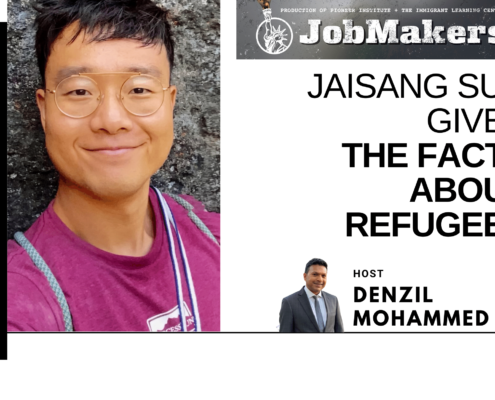
Jaisang Sun Gives the Facts About Refugees
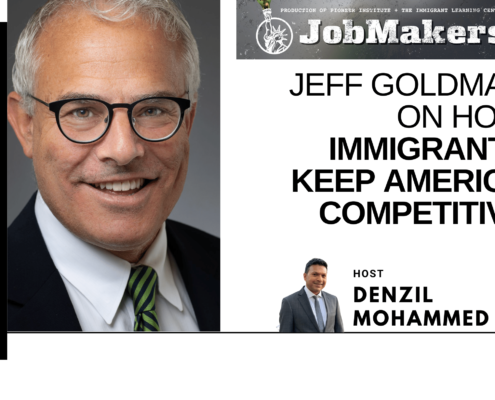
Jeff Goldman on How Immigrants Keep America Competitive

Trevor Mattos Shows How Massachusetts Runs on Immigrants
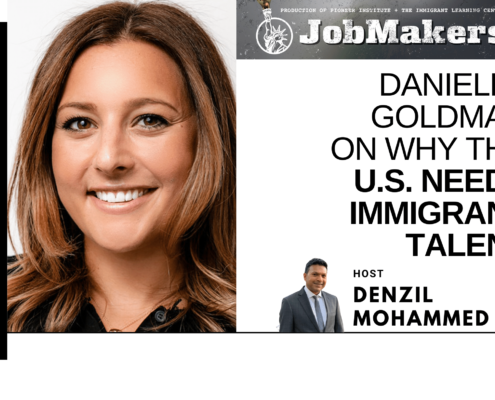
Danielle Goldman on Why the U.S. Needs Immigrant Talent
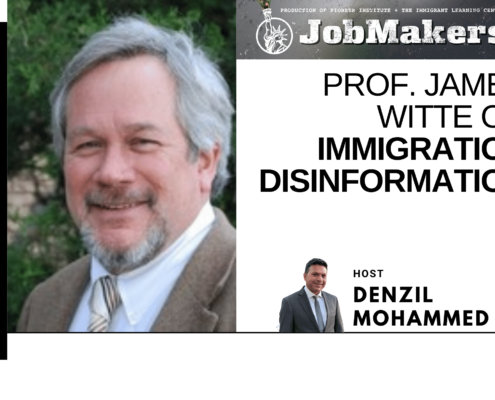
Prof. James Witte on Immigration Disinformation
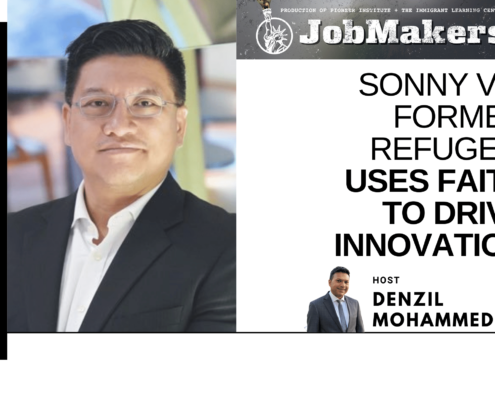
Sonny Vu, Former Refugee, Uses Faith to Drive Innovation
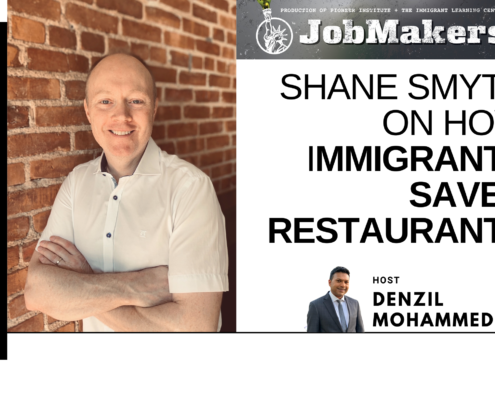
Shane Smyth on How Immigrants Saved Restaurants
